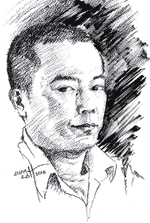
| By YENI | Sunday, June 6, 2010 |
An hour-long documentary film on Burma's nuclear ambitions and tunnel-building program has reawakened alarm throughout the region about the Burmese regime's military relationship with North Korea.
The film was made by the Norway-based Democratic Voice of Burma (DVB) and broadcast recently by Al Jazeera.[See full coverage]
 |
| Yeni is news editor of the Irrawaddy magazine. He can be reached at [email protected]. |
Its contents were cause for particular concern within the Association for Southeast Asian Nations, which has reached an agreement for a nuclear weapons-free zone,
One expert, Robert E. Kelley, a retired senior UN nuclear inspector, said that although the film depicted “unrealistic attempts” by the Burmese regime to attain a nuclear capability “success may be beyond Burma’s reach.”
Nevertheless, Kelley said, “the intent is clear and that is a very disturbing matter for international agreements.”
The main witness in the DVB film is a young Burmese military specialist on rocket engines, who left Burma in February with highly sensitive information purporting to show that Burma has acquired components for a nuclear weapons program, including technology for uranium enrichment and long-range missiles, with the help of North Korea.
The defector, Sai Thein Win, also brought fresh evidence that DVB says shows the construction of a secret network of hidden bunkers and tunnels across the country.
In the DVB film, he and other defectors also reveal bunkers alleged to be used as secret military storage facilities and command centers in case of aerial attacks. Some tunnels are marked as substations for fiber optic cables which the report says are part of a plan to provide the military with a secure nationwide communications network.
Experts suggest that the total cost of the secret programs could run into billions of US dollars—a huge outlay that the regime can nevertheless raise through an expected increase in energy revenues.
A study by the Washington-based United States Institute of Peace said Burma's export earnings from the country's growing energy sector will double in the next five years, due mainly to oil and gas transit pipelines now being built from Burma to China. Burma’s earnings from gas exports represented at least 45 percent of its US $6.6 billion income in 2008.
Burma's military regime is infamous for spending a large percentage of its national budget on the military, rather than on education, health and other public services.
While 40 to 60 percent of the national budget is allocated to the military, the Burmese people have to struggle daily with a highly inefficient public services sector.
For instance, Burma’s central economic-administrative corridor between Rangoon and Naypyidaw, via Mandalay, suffers severe electricity shortages. Business owners in Burma complain they may have to shut down because of the decision by the state power authority to halt supplies to industrial users owing to the lack of water to drive hydropower plant turbines.
Despite its impressive store of natural resources, Burma remains one of the world's poorest countries. Its average 2.9 percent annual growth rate is the lowest in the Greater Mekong Subregion.
Disenchantment with the hardships of life under the regime is likely to have contributed to the defection of several Burmese military officers such as Sai Thein Win.
Consequently, there was no major military reshuffle in Naypyidaw in the recent four-monthly meeting ahead of this year's planned general election.
The lack of a reshuffle is also a signal that junta leader Snr-Gen Than Shwe, 77, his No 2, vice Snr-Gen Maung Aye, 72, and other aging top generals may not retire from their military posts in the near future because of growing doubts about the loyalty of younger officers.
Meanwhile Prime Minister Thein Sein and several government ministers recently resigned their military positions to found a political party, the Union Solidarity and Development Party, to contest the upcoming regime-controlled election.
Despite the maneuvers by the top generals to keep hold of the reins of power, some so-called experts believe naively the election will change Burma’s political landscape.
The latest briefing by one leading global think tank, the International Crisis Group (ICG), said the election would be “the best opportunity in a generation to influence the future direction of the country.”
The ICG should ask the voters—including military personnel and their family members who voted overwhelmingly for the opposition National League for Democracy in the 1990 election—whether they will be free to cast their votes as they wish this time around.
Sai Thein Win has made his own position clear. The DVB Web site says that he went public with the information he had on Burma's nuclear ambitions because he wanted to help stop what he sees as “a dangerous, badly organized and expensive waste.”